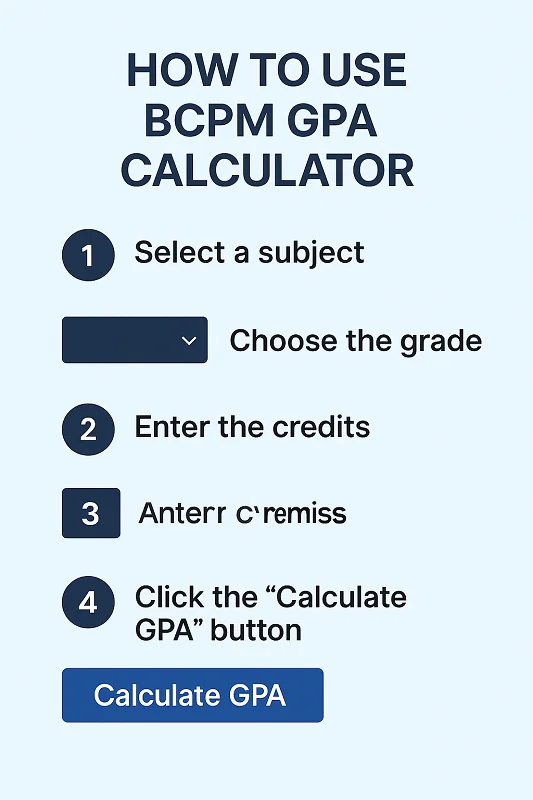When applying to medical school, your grades in science courses carry exceptional weight in the admissions process. The BCPM GPA serves as a critical metric that admissions committees use to evaluate your preparedness for the rigorous coursework ahead. Understanding how to calculate and optimize your science GPA can significantly impact your chances of acceptance.
This comprehensive guide will walk you through everything you need to know about BCPM GPA calculation, from understanding which courses count to using tools that simplify the process.
What Is the BCPM GPA?
BCPM GPA stands for Biology, Chemistry, Physics, and Mathematics Grade Point Average. This specialized calculation focuses exclusively on your performance in foundational science and mathematics courses that form the backbone of medical education.
Unlike your overall cumulative GPA, which includes all coursework from literature to foreign languages, the BCPM GPA isolates your academic performance in subjects directly relevant to medical school. This targeted approach gives admissions committees a clearer picture of your scientific aptitude and readiness for medical studies.
The BCPM GPA is also commonly referred to as the “science GPA” throughout the medical school application process. Both terms are used interchangeably across different application services, including AMCAS (American Medical College Application Service), AACOMAS (American Association of Colleges of Osteopathic Medicine Application Service), and TMDSAS (Texas Medical and Dental Schools Application Service).
Why Does BCPM GPA Matter for Medical School Admissions?
Your science GPA serves as one of the strongest predictors of success in medical school coursework. Admissions committees rely heavily on this metric because it demonstrates your ability to excel in the scientific foundation that underlies all medical practice.
AMCAS, AACOMAS, and TMDSAS applications all calculate and prominently display your BCPM GPA alongside your cumulative GPA. Medical schools use both metrics to:
- Screen applicants during initial review processes
- Predict academic success in basic science courses
- Compare candidates from different undergraduate institutions
- Meet accreditation standards for incoming class statistics
Most competitive medical schools expect BCPM GPAs of 3.7 or higher, though this varies significantly by institution and applicant pool. A strong science GPA can compensate for weaknesses in other application areas, while a low BCPM GPA often requires significant offsetting factors like exceptional MCAT scores or extensive research experience.
The separate calculation also helps admissions committees identify grade trends. Students who perform well in science courses but struggle in humanities may still be competitive candidates, as this pattern suggests strong aptitude for medical coursework.
How to Calculate Your BCPM GPA (Step-by-Step)
Calculating your BCPM GPA manually requires careful attention to course classification and proper weighting by credit hours. Follow these detailed steps to ensure accuracy:
Step 1: List Eligible Courses
Review your complete undergraduate transcript and identify all courses that fall under Biology, Chemistry, Physics, or Mathematics categories. Include:
- All biology courses (general biology, anatomy, physiology, genetics, etc.)
- All chemistry courses (general chemistry, organic chemistry, biochemistry, etc.)
- All physics courses (general physics, biophysics, etc.)
- All mathematics courses (calculus, statistics, algebra, etc.)
Step 2: Add Credit Hours and Grades
For each qualifying course, record:
- Course name and number
- Number of credit hours
- Letter grade received
- Grade points (if applicable)
Step 3: Convert Grades to Points
Use the standard 4.0 scale conversion:
- A = 4.0 points
- A- = 3.7 points
- B+ = 3.3 points
- B = 3.0 points
- B- = 2.7 points
- C+ = 2.3 points
- C = 2.0 points
- And so forth…
Step 4: Calculate Weighted GPA
Formula: BCPM GPA = (Sum of Grade Points × Credit Hours) ÷ (Total Credit Hours)
For each course, multiply the grade points by credit hours, then sum all results. Divide this total by the sum of all credit hours for your final BCPM GPA.


